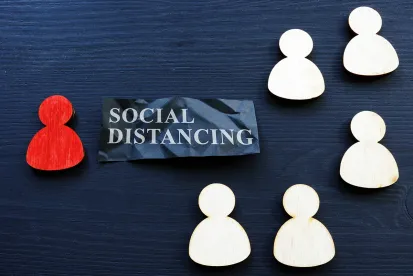The first COVID-19 vaccines have started being shipped across the U.S. with the expectation that millions of doses will be administered over the next few weeks, with many times more over the coming months. This is unequivocally good news and reason for optimism. Meanwhile, however, the pandemic continues to spread nationwide and the numbers are rising rapidly.
The unabated second wave spike of COVID-19 infections arriving with the holiday season and our traditional time for gatherings has led governors, mayors and health departments across the country to tighten restrictions on indoor and outdoor gatherings, pause indoor practices and competitions for youth and adult sports, broaden travel restrictions and amplify their encouragement of health safeguarding measures. Following are examples of recent measures.
Federal: On December 2, 2020, the Center for Disease Control (CDC) issued guidance reminding people that travel can increase the risk of spreading and getting COVID-19 and advising in bold-faced type: “Postponing travel and staying home is the best way to protect yourself and others from COVID-19.”
California: The Regional Stay Home Order, announced December 3, 2020, and a Supplemental Order, signed December 6, 2020, will go into effect at 11:59 PM the day after a region has been announced to have less than 15% ICU availability. These orders prohibit private gatherings of any size with members of other households, close sector operations except for critical infrastructure and retail, limit the capacity of retail operations to 20% (and 35% for grocery stores), and, as announced, continue the requirements of 100% masking and physical distancing. The supplemental order clarifies the requirements for retail operations and goes into effect immediately.
Once triggered, these orders will remain in effect for at least 3 weeks. After that period, they will be lifted when a region’s projected ICU capacity meets or exceeds 15%. This will be assessed on a weekly basis after the initial 3-week period. Learn more about these orders.
Delaware: On December 10, 2020, Governor John Carney issued an Order modifying the state’s Declaration of Emergency (the “Order”). The Order, which becomes effective December 14, 2020, among other things, adds mask-wearing requirements, reduces the numbers of persons permitted to gather at indoor events and worship services, and imposes additional business restrictions, including:
-
Limiting indoor capacity of businesses with more than 100,000 square feet and food courts to 20 percent of stated fire occupancy requirements,
-
Limiting businesses with up to 100,000 square feet, including most retail establishments and all food and drink establishments, to 30 percent of stated fire occupancy requirements,
-
Limiting tables within food and drink establishments to parties of six, consisting of no more than four adults, and requiring the placement of a sign on each table stating that parties seated together must be from the same household,
-
Limiting retail establishments with fewer than 5,000 square feet, all houses of worship, and funeral services to 40 percent of stated fire occupancy requirements,
-
Imposing a 10 p.m. curfew on restaurants and bars; but permitting restaurants, to deliver after 10 p.m.,
-
Limiting exercise classes at gyms to 10 people and requiring those who are not part of the same household to remain at least 13 feet apart during classes, and
-
Limiting indoor gatherings at businesses or indoor spaces open to the public to the lesser of 30 percent of the venue’s stated fire occupancy requirements, or 10 people.
In addition, beginning December 14, 2020 and ending January 11, 2020, unless extended, the Order strongly encourages residents, “to stay home as often as possible and to only leave home to go to work or school, or for necessary needs such as seeking medical care, going to the grocery store or pharmacy, or picking up food.” The Order further encourages individuals leaving their residence for work, school or other activities to take various listed steps to reduce transmission of COVID-19. These include: not gathering with non-household members in their homes or yours, maintaining social distance, wearing face covering in any indoor gathering or event with non-household members, regular hand washing, carrying and frequently using hand sanitizer, regularly cleaning high touch surfaces, staying home if sick (except to seek medical attention) and avoiding unnecessary travel.
District of Columbia: On December 7, Washington, DC Mayor Muriel Bowser issued Mayor’s Order 2020-123 (“Order”) tightening restrictions on sports and recreation in the District. The Order, which took effect Friday, December 11, 2020, prohibits high contact sports, as defined by the Department of Health (i.e., basketball, boxing, football, hockey, lacrosse, martial arts, rugby, soccer and wrestling); universities and professional leagues, however, may continue to organize and administer practices and competitions for their athletes, provided they follow an approved health and safety plan. Among other things, the Order requires high schools to suspend sports activities and competitions, requires that recreation centers suspend all sports and organized athletic activities, and imposes a variety of other requirements related to social distancing during athletic activities and event, such as requiring that physical education classes only involve activities where students can maintain six feet of distance from each other.
Massachusetts: On December 8, 2020, Governor Charles D. Baker issued COVID-19 Order No. 57 (“Order”), which tightens the limitations on indoor and outdoor gatherings. The Order becomes effective December 13, 2020, supersedes, and rescinds COVID-19 Order No. 54. With limited exception, summarized below, the Order:
-
requires social distancing by all participants at an indoor or outdoor gathering, except where participants are from the same household,
-
for private residences or other non-event venues or public spaces, limits indoor gatherings to a maximum of 10 people and limits outdoor gatherings to a maximum of 25 people,
-
for event venues and public spaces, limits indoor gatherings to a maximum of 25 people and outdoor gatherings to a maximum of 50 people,
-
requires the operator of an outdoor gathering of more than 25 people to provide prior notice the Local Board of Health,
-
requires all gatherings to end and the participants to disperse by no later than 9:30 p.m.
The Order’s gathering limitations do not apply to businesses that are complying with Indoor and Outdoor Events Guidance issued by the Department of Labor Standards, or those Phase I, II, III enterprises complying with sector-specific safety rules and capacity limitations. In addition, the Order does not apply to religious activities (which remain subject to Places of Worship sector-specific rules) or to outdoor political gatherings.
New York: On December 9, 2020, Governor Andrew Cuomo issued Executive Order 202.80 extending the state’s disaster emergency another thirty days through January 8, 2021.
North Carolina: On December 8, 2020, Governor Roy Cooper issued Executive Order 181 (“Order”) implementing a modified stay at home order and requiring nighttime closure of certain businesses and activities. The Order requires people to stay at home between 10:00 p.m. and 5:00 a.m. and takes effect Friday, December 11.
The Order specifically requires restaurants, bars, entertainment venues, personal care businesses and more to close by 10:00 p.m. The Order exempts travel to and from work, to obtain food, medical care, fuel or social services, or to take care of a family member. In addition, professional and collegiate sporting events may continue past 10 p.m. The Order also moves the alcohol curfew from 11 p.m. to 9:00 p.m. Face coverings continue to be required in all indoor public settings. For more information, see the Order’s FAQ.
The Order exempts worship, religious, and spiritual gatherings, funeral ceremonies, wedding ceremonies, and other activities constituting the exercise of First Amendment rights from all Order requirements, but “strongly urges that entities and individuals engaging in these exempted activities follow the Recommendations to Promote Social Distancing and Reduce Transmission, wear and require face foverings, and avoid exceeding Emergency Maximum Occupancy in the places where they meet.”
Pennsylvania: On December 10, 2020 Governor Tom Wolf and Secretary of Health Dr. Rachel Levine announced new, limited-time mitigation orders, which took effect at 12:01 a.m. on December 12, and remain in effect until 8 a.m. on January 4, 2021 (the “Orders”). (Gov. Wolf Limited Time Mitigation Order and Sec. Levine Limited Time Mitigation Order). The Orders prohibit the following, among others:
-
all indoor dining in the retail food services industry (g., bars, restaurants, breweries, wineries, distilleries, social clubs, and private catered events),
-
indoor gatherings and events of more than 10 persons (excluding places of worship)
-
outdoor gatherings of more than 50 persons
-
indoor operations of gyms and fitness facilities
-
operating in-person businesses serving the public at more than 50% maximum occupancy, unless an existing order requires smaller capacity,
-
operation of indoor entertainment businesses (g., theaters, concert venues, museums, movie theaters, arcades, casinos, bowling alleys, private clubs, and all other similar entertainment, recreational or social facilities), and
-
all sports at K-12 public schools, nonpublic schools, private schools and club, travel, recreational, intermural, and intramural sports (professional and collegiate sports activities may continue in accordance with guidance from the CDC and Department of Health).
Virginia: On December 10, 2020, Governor Ralph Northam announced new measures to slow the spread of COVID-19 in Virginia. Pursuant to Executive Order 72, Virginians will have to stay at home between the hours of 12:00 a.m. and 5:00 a.m., unless traveling to obtain food or goods, to work, or to seek medical attention; wear a face covering in indoor settings shared with others and when outdoors within 6 feet of another person; and limit social gatherings (both indoor and outdoor) to 10 people. The order will be effective 12:01 a.m. on Monday, December 14 through January 31, 2021, unless rescinded or amended.
In sum, while there is great hope that we are turning a corner toward overcoming the pandemic, for now, exercising precautions to stem COVID-19’s spread remains the order of the day.




 />i
/>i
